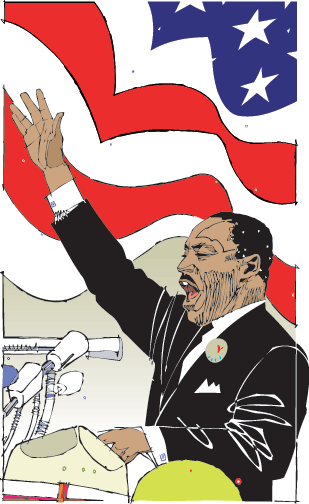

Sites Outside the Federal Government
Martin Luther King, Jr. Holiday
January 17, 2005
The King holiday is celebrated in some form in more than 100 countries around the world. Born in Atlanta on January 15, 1929, Martin Luther King, Jr. was one of the world's best known advocates of non-violent social change strategies. Although King's roots were in the African-American Baptist church, he synthesized ideas drawn from many different cultural traditions. Dr. King is known for being one of the greatest orators of the twentieth century, and perhaps in all of American history. In the 1950s and 1960s, his words led the Civil Rights Movement and helped change society. He is best known for helping achieve civil equality for African Americans, but his true goal was much larger than that: He hoped to achieve acceptance for all people, regardless of race or nationality.
Since 1986, the third Monday in January has been a national legal holiday marking the birthday of Dr. Martin Luther King, Jr. Dr. King was born on January 15, 1929, the son and grandson of Atlanta pastors. Dr. King was an eloquent Baptist minister and leader of the civil-rights movement in America from the Mid-1950s until his death by assassination in 1968. He is remembered and respected today as a national hero and one of the world's leading proponents of non-violent social change.
In 1955, Dr. King made his first mark on the civil rights movement by mobilizing the black community in a 382-day boycott of Montgomery, Alabama's bus lines. Just five days after the Rosa Parks refused to give her bus seat up to a white man, King was elected president of the Montgomery Improvement Association, which was formed by blacks who had decided to boycott the bus system. On December 21, 1956, the Supreme Court of the United States declared unconstitutional the laws requiring segregation on buses. During the boycott, King was arrested, his home was bombed, and he was subjected to personal harassment.
In 1957, Dr. King became president of the newly-formed Southern Christian Leadership Conference, an organization formed to provide new leadership for the now burgeoning civil rights movement. In the eleven-year period between 1957 and 1968, King traveled over six million miles and spoke over twenty-five hundred times, appearing wherever there was injustice, protest, and action; and meanwhile he wrote five books as well as numerous articles. In these years, he led a massive protest in Birmingham, Alabama, that caught the attention of the entire world, providing what he called a coalition of conscience and inspiring his "Letter from a Birmingham Jail;" he planned the drives in Alabama for voter registration; he directed the peaceful 1963 March on Washington of 250,000 people to whom he delivered his address, "I Have a Dream;" he conferred with President John F. Kennedy and campaigned for President Lyndon B. Johnson; he was arrested upwards of twenty times and assaulted at least four times; he was awarded five honorary degrees; was named Man of the Year by Time magazine in 1963; and became not only the symbolic leader of American blacks but also a world figure.
In 1964, At the age of thirty-five, Martin Luther King, Jr., was the youngest man to have received the Nobel Peace Prize. He was awarded the prize for his efforts to promote nonviolent social change. While at seminary King had become acquainted with Mohandas Gandhi's philosophy of nonviolent social protest. On a trip to India in 1959 King met with followers of Gandhi. During these discussions he became more convinced than ever that nonviolent resistance was the most potent weapon available to oppressed people in their struggle for freedom.
On the evening of April 4, 1968, while standing on the balcony of his motel room in Memphis, Tennessee, where he was to lead a protest march in sympathy with striking garbage workers of that city, Dr. King was assassinated. He was only 39 at the time of his death. He had never wavered in his insistence that nonviolence must remain the central tactic of the civil-rights movement, nor in his faith that everyone in America would some day attain equal justice.
skip disclaimer
Disclaimer: The OCR Web site contains information originating from other organizations, both public and private. The Web site also contains hyperlinks to documents and resources from such public and private organizations. While every attempt is made to ensure that all information is accurately referenced on our site, we do not guarantee the accuracy, timeliness or quality of the content of these outside sources. The inclusion of hyperlinks does not indicate endorsement of any particular products, companies, information providers or the content of the referenced sites.
OCR Home| DOC Home | Contact OCR | Resources | Publications | Privacy Policy | Disclaimers
We welcome your feedback on this site. Please e-mail comments and suggestions to hmahoney@doc.gov
Help us make our site accessible. Please send us your feedback on accessibility.
Page last updated: